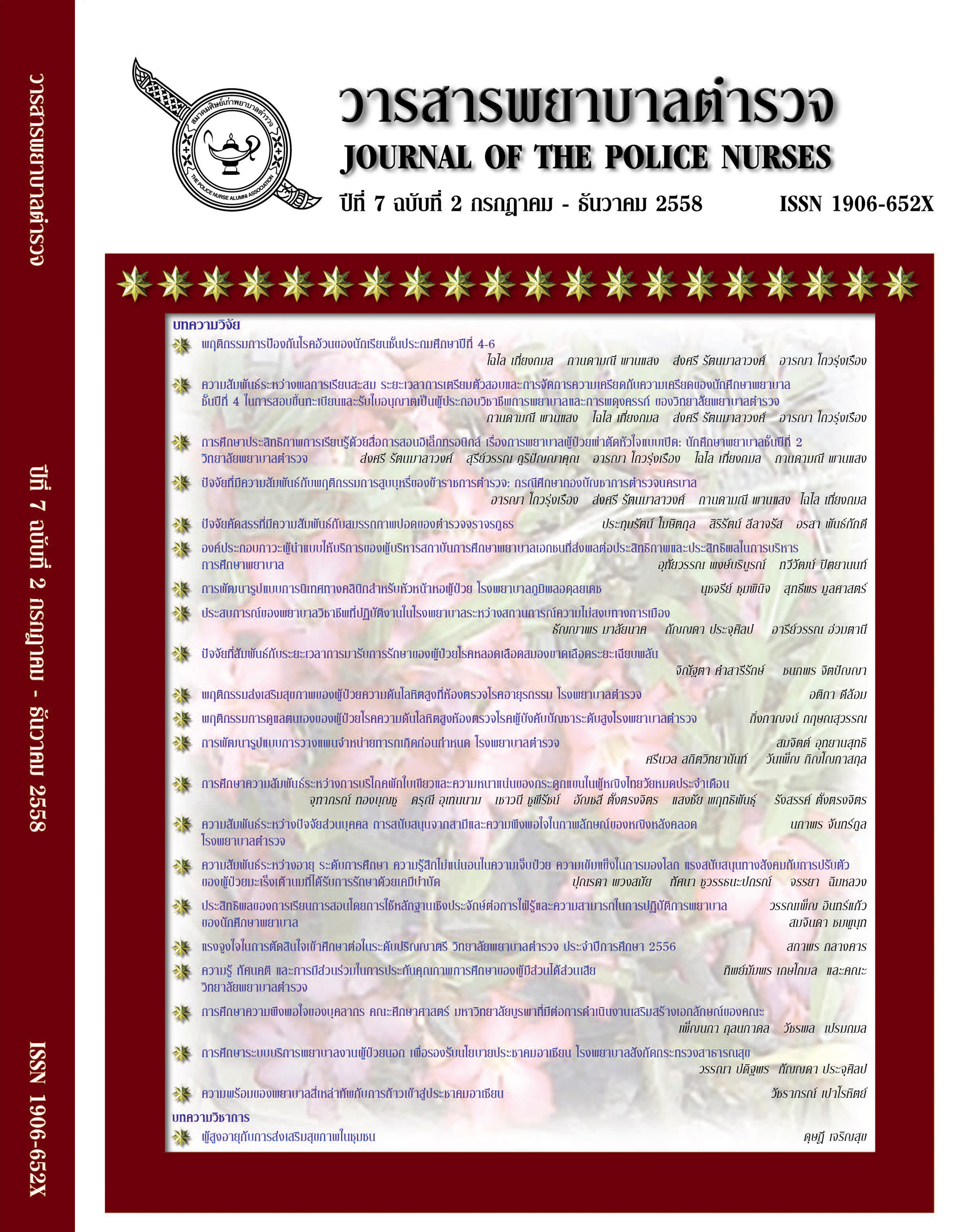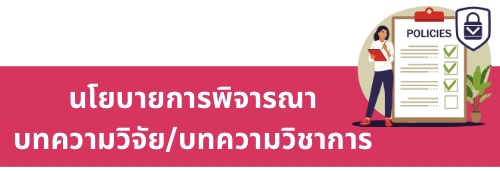ความรู้ ทัศนคติ และการมีส่วนร่วมในการประกันคุณภาพการศึกษาของผู้มีส่วนได้ส่วนเสีย วิทยาลัยพยาบาลตำรวจ
คำสำคัญ:
ความรู้, ทัศนคติ, การมีส่วนร่วม, ผู้มีส่วนได้ส่วนเสีย, การประกันคุณภาพการศึกษา, Knowledge, Attitude, Participation, Stakeholders, Educational Quality Assuranceบทคัดย่อ
การศึกษาครั้งนี้มีวัตถุประสงค์ เพื่อศึกษาความรู้ ทัศนคติ และการมีส่วนร่วมในการประกันคุณภาพการศึกษาของผู้มีส่วนได้ส่วนเสีย วิทยาลัยพยาบาลตำรวจ ตัวอย่างและผู้ให้ข้อมูลเลือกอย่างเจาะจง มี 6 กลุ่ม ได้แก่ ผู้บริหาร อาจารย์ บุคลากร นักศึกษา ศิษย์เก่า และผู้จ้างงาน รวมทั้งสิ้น 90 คน เครื่องมือที่ใช้ในการวิจัยได้แก่ แบบทดสอบความรู้เกี่ยวกับการประกันคุณภาพการศึกษา แบบวัดทัศนคติต่อการประกันคุณภาพการศึกษา และแบบสัมภาษณ์แบบมีโครงสร้าง ตรวจสอบคุณภาพของเครื่องมือ โดยให้ผู้ทรงคุณวุฒิจำนวน 3 ท่าน ตรวจสอบความตรงตามเนื้อหาของแบบทดสอบ และแบบวัดทัศนคติ ได้ค่า IOC เท่ากับ 0.6-1.0 ตรวจสอบความเที่ยงของแบบทดสอบ ได้ค่า KR-20 เท่ากับ .59 และความเที่ยงของแบบวัดทัศนคติ ได้ค่าสัมประสิทธิ์แอลฟาของครอนบาค เท่ากับ .91
ผลการศึกษาพบว่า 1) อาจารย์และบุคลากรยังขาดความรู้ความเข้าใจเกี่ยวกับการประกันคุณภาพการศึกษา (ร้อยละ 36.7) 2) อาจารย์และบุคลากรมีคะแนนทัศนคติต่อการประกันคุณภาพในระดับมากที่สุด (=4.59, SD=.74) 3) อาจารย์และบุคลากรมีทัศนคติทางบวกต่อการประกันคุณภาพการศึกษา ได้แก่ “ผลการประเมินทำให้หน่วยงานเป็นที่ยอมรับ” และ ”ยินดีที่ช่วยนำผลประเมินไปใช้” (ร้อยละ 100) “เพิ่มความสามารถในการปฏิบัติงาน”, “ผลประเมินบอกจุดอ่อนจุดแข็งในการพัฒนา” และ “ภูมิใจที่มีส่วนร่วม” (ร้อยละ 96.7) “พอใจกับข้อเสนอแนะ” และ “อาสางาน แม้ไม่ค่อยมีเวลา” (ร้อยละ 93.3) “แม้ไม่ค่อยมีเวลา จะพยายามเข้าร่วมประชุมหรือร่วมกิจกรรม” (ร้อยละ 90.1) 4) อาจารย์และบุคลากรมีทัศนคติทางลบต่อการประกันคุณภาพการศึกษา ได้แก่ เพิ่มภาระงาน (ร้อยละ 53.3) เบื่อหน่ายกับการตรวจประเมิน (ร้อยละ 30) เลือกทำกิจกรรมอื่น หรือไม่อ่านคู่มือประกันคุณภาพการศึกษา (ร้อยละ 30) ไม่พอใจที่ได้รับมอบหมายให้เก็บรวบรวมหลักฐานประกอบการรับตรวจประเมิน (ร้อยละ 26.7) ไม่พอใจที่ต้องเขียนรายงานประเมินตนเอง (ร้อยละ 26.6) ผลการประเมิน นำไปใช้พัฒนาหน่วยงานไม่ได้ (ร้อยละ 20) และพยายามหลีกเลี่ยงการเข้าร่วมการรับตรวจประเมิน (ร้อยละ 16.7) สำหรับการมีส่วนร่วมตามวงจร PDCA พบว่า ยังไม่ชัดเจน และยังไม่ครอบคลุมทุกขั้นตอน ผู้มีส่วนได้ส่วนเสียมีส่วนร่วมเพียงบางส่วนหรือเล็กน้อยเท่านั้น ปัญหาอุปสรรคคือ นโยบายไม่ชัดเจน ไม่มีหน่วยงานหลักเป็นผู้รับผิดชอบ ขาดการประสานงานและการสื่อสารที่ชัดเจน ไม่สามารถบูรณาการเป็นงานประจำ และนำผลไปใช้ยังไม่ครอบคลุมทุกประเด็น
KNOWLEDGE, ATTITUDE, AND THE PARTICIPATION IN EDUCATIONAL QUALITY ASSURANCE OF STAKEHOLDERS OF POLICE NURSING COLLEGE
Abstract
This study aimed to investigate knowledge, attitude, and the participation in educational quality assurance of all stakeholders of Police Nursing College. There were six groups or 90 samples and key informants. They were administrators, instructors, personnel, students, alumni, and employers. The instruments used in the study were test and questionnaires which ware check by three experts for content validity. The IOC was 0.6-1.0. The reliability of the test (KR-20) was .59. The internal consistency of the questionnaire (Cronbach’s alpha coefficient) was .91. Data were analyzed for statistical values as frequency, percentage, mean and standard deviation.
The results of this study indicated that 1) the instructors and personnel lacked of knowledge and the understanding of the educational quality assurance (36.7%); 2) Their attitude toward the educational quality assurance was at the highest level (=4.59, SD=.74); 3) their attitudes toward the educational quality assurance were positive, including being the acceptable workplace from accreditation, being pleasure with evaluation utilization (100%) increasing their performance, knowing strength and weakness for improvement, being proud of participation (96.7%), being satisfied in suggestions, donating their time (93.3%), trying to participate (90.1%); 4) their attitudes toward the educational quality assurance were negative, including increasing workload (53.3%), boring (30%), doing other activities more than reading the manual (30%), no satisfaction in collecting quality assurance evidences (26.7%), no satisfaction in writing self assessment report (26.6), no results for institution’s improvement (20%), and avoiding attending QA process (16.7%); 3) the participation engaging the PDCA cycle was not clear and could not cover every step. Stakeholders involved only some occasions. The reasons why they partly participation were no clear policies, no specific agency for responsibility, lacking of coordination and clear communication, no integration into the routine, and utilization of results only in some issues.
Downloads
ดาวน์โหลด
เผยแพร่แล้ว
รูปแบบการอ้างอิง
ฉบับ
ประเภทบทความ
สัญญาอนุญาต
ผลงานที่ได้ตีพิมพ์แล้วจะเป็นลิขสิทธิ์ของวารสารพยาบาลตำรวจ















